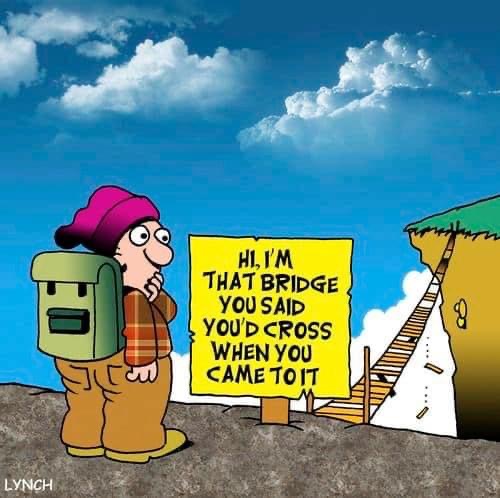- Home
- Krav Maga Blog
- Krav Instructors
- Train in Israel
- Tour Train Israel
- Krav Shop
- DVD
- Kickboxing
- IKI Near Me
- Seminars
- IKI Membership
- On-Line Training
- Krav Maga Training
- Testimonials
- History Krav Maga
- Instructors Page
- Past Blogs
- Spanish
- Italian
- Certification
- Contact
- Holland Seminar
- Vienna Seminar
- Poland Seminar
- Italy Seminar
- Belt Requirements
Cross that Bridge
BY MOSHE KATZ
CEO
ISRAELI KRAV INTERNATIONAL
July 7, 2023, Israel

"Hi, I'm that bridge you said you would cross when you came to it."
The cartoon shows a traveler looking very confused as he approaches a bridge. The bridge is in a terrible state of disrepair, in fact, it is impossible to pass it. If one attempted to cross the bridge they would surely fall into the abyss and lose their life. The point of the cartoon, the message, is that in fact, this is not a good way to live. This is not a wise way to live. If we keep pushing things off into the future, to deal with it later, we will certainly face certain death.
There is an old expression, we will cross that bridge when we get to it.
What this means basically, is let us not worry too much about the future, let us not worry about situations that may or may not emerge in the future, let's focus on the issues at hand and worry about the rest later.
There are differente way to look at this. Such as, Deal with a situation when, and not before, it occurs. or, Do not worry about a possible future problem but rather deal with it when and if it happens.
The earliest known reference is from a writer in the year 1851.
Here are some common examples of the use of this concept.
Let's cross that bridge when we come to it," a way of telling someone not to worry about something that has not happened yet. John: Where will we stop tonight? Jane: At the next town. Alan: What if all the hotels are full? Jane: Let's cross that bridge when we come to it.
Here is another way to look at it: Because there are many problems on life’s journey, you will have to cross many dangerous bridges. However, it won’t help you to stress out about all of these bridges at once. It’s better to focus on each one as it approaches. There’s no sense in worrying about something that may or may not happen.
Now the second approach, in my opinion, has some value. We do not want to be neurotic; we do not want to suffer from anxiety. We can't worry about everything that might happen in life. Perhaps someday you will end up in Japan, or in Russia. That does not mean that as a child your parents should arrange for you to master those languages. Perhaps some day you will join the military, and end up in a South American jungle, but that does not mean that every child growing up in the city should devote time to jungle survivor skills. If some day in the future you will plan an expedition to those areas, you will cross that bridge when you get to it.
But the other interpretation, I reject wholeheartedly.
Let's look at one example again, John: Where will we stop tonight? Jane: At the next town. Alan: What if all the hotels are full? Jane: Let's cross that bridge when we come to it. If this is an area where there are not many travelers, and where you are fairly certain to find a hotel room, good. What if we are dealing with the tourist season in a popular area. Crossing that Bridge when you get to it, may very well mean that you will arrive late at night and find no rooms available. Alternatively, it may mean that you have to spend the night in a substandard hotel not to your liking. Even worse, you may end up in a dangerous roadside motel frequented by drug addicts and prostitutes. You may be robbed or killed. Thus, the idea of "crossing that bridge when you get to it" is not very wise. Better to plan ahead and reserve a room.
The same thing applies to flights. When someone is hosting me for a seminar and delays with booking the flight, I say we must stick to a timetable. Experience has taught me that waiting to "cross that bridge when we get to it", may mean, very expensive flights, very inconvenient flights, or no flights at all.
Simply put, luck favors the prepared. The traveler who did not worry about the bridge until he reached it, now finds that he cannot cross that bridge. Now that he has arrived, and reached that bridge, he will not cross that bridge.
We can offer countless examples of the failure of this old adage, based on the first interpretation, not the second. Naturally I want to apply this to Krav Maga. When it comes to personal safety, protection of your home, of your community, of your nation, that idea of ...crossing that bridge when we get to it, is the worst possible advice imaginable. No, we must Anticipate, we must Prepare, we must Train.
We must think of every possible danger that might come our way and prepare for it. And if that "bridge" never comes, we have still benefited from our training by becoming stronger individuals. The side effects of training; becoming stronger more determined people, take-charge individuals, will benefit us in all aspects of our lives. The training is never wasted.
But if, God forbid, we do encounter that "Bridge", we will be ready for it.

Moshe Katz, 7th dan Black Belt, Israeli Krav Maga. Certified by Wingate Institute. Member Black Belt hall of fame, USA and Europe.
Understand the Israeli Fighting Mentality - Israel a Nation of Warriors by Moshe Katz

What is the cultural background of Krav Maga? What makes it unique? What makes the Israeli military so effective? Why are Israeli security systems used all over the world?
What are the Biblical origins of Krav Maga and who was the first Krav Maga instructor?
What weapons and military strategies did our Biblical ancestors use?
How has Krav Maga developed in Israel and what are its goals?
All that and more in this unique book.
Start Your REAL Training TODAY
Or is someone coming to save you?
IKI Krav Maga online distance training - Leading to ranks and certification.
Tour and Train Israel Experience
Personal Training - If you are interested in personal Krav Maga training please contact us on the form below.
